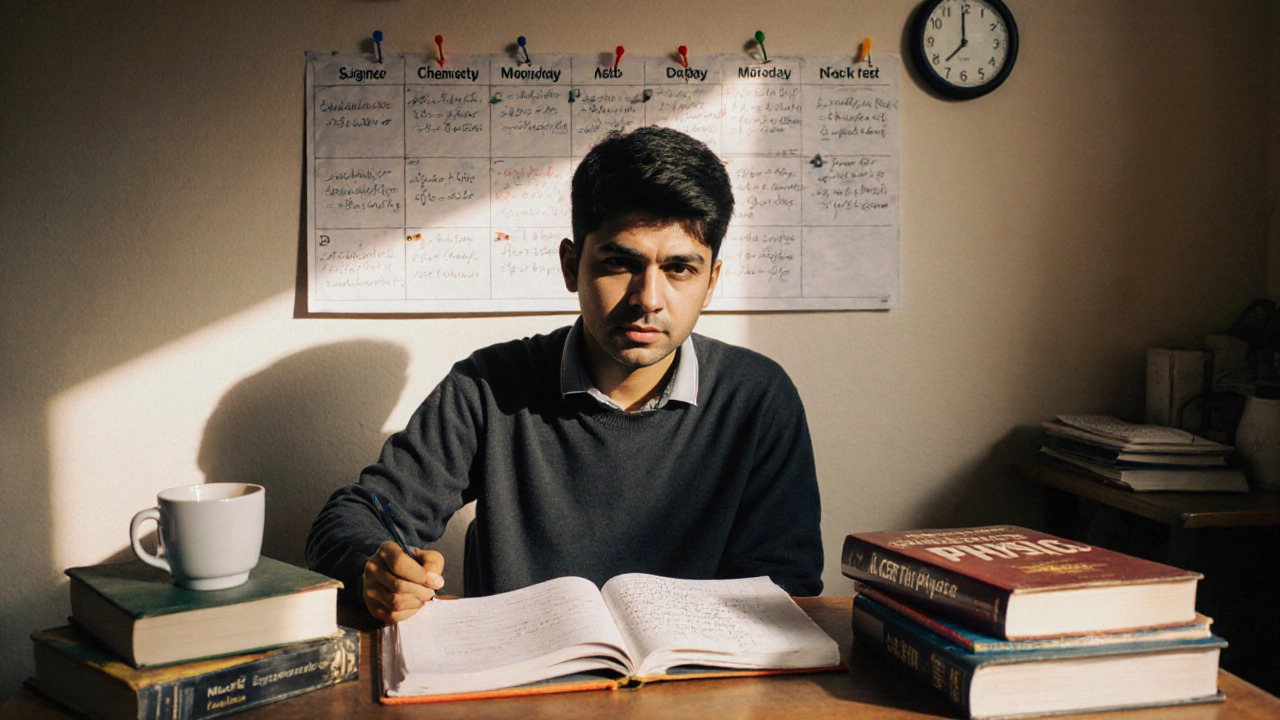Starting IIT JEE preparation feels overwhelming. You’re not alone. Every year, over 1.5 million students take JEE Main, and only about 25,000 make it into the IITs. The competition is fierce, but it’s not impossible. The key isn’t studying harder-it’s studying smarter from day one.
Understand the Exam Structure First
Before you open a single textbook, know what you’re up against. JEE has two stages: JEE Main and JEE Advanced. JEE Main is the qualifying test-clear it, and you’re eligible for JEE Advanced, which decides your IIT seat. Both exams test Physics, Chemistry, and Mathematics. But here’s the catch: JEE Main is more about speed and accuracy. JEE Advanced is about deep understanding and problem-solving under pressure.
Don’t waste time on outdated patterns. Since 2023, JEE Main has shifted to a more application-based format. Questions now focus on real-world scenarios-like calculating friction in a moving elevator or balancing redox reactions in industrial processes. Memorizing formulas won’t cut it anymore. You need to know why they work.
Build a Realistic Study Plan
Most students fail because they treat preparation like a sprint. It’s a marathon. If you’re in Class 11, you have 24 months. That’s enough-if you use it right.
Start by mapping out your week. Block 5-6 hours daily for focused study. Split it: 2 hours for theory, 2 hours for practice problems, 1 hour for revision. Sundays? Use them for a full-length mock test. No exceptions.
Here’s a simple weekly rhythm:
- Monday-Wednesday: Focus on one subject (e.g., Physics)
- Thursday-Friday: Switch to another (e.g., Chemistry)
- Saturday: Math practice
- Sunday: Full mock test + error analysis
Don’t try to cover everything at once. Master one topic before moving on. For example, finish Newton’s Laws in Physics before jumping to Rotational Motion. In Math, nail down Quadratic Equations before tackling Calculus. Skipping ahead creates gaps that haunt you later.
Choose the Right Study Materials
You don’t need 20 books. You need the right 3-4.
For Physics: Start with Concepts of Physics by H.C. Verma. It’s clear, practical, and full of problems that mirror JEE’s style. Once you’re confident, move to Problems in General Physics by I.E. Irodov for advanced challenges.
For Chemistry: NCERT textbooks are non-negotiable. Read them line by line. Then use Organic Chemistry by Morrison & Boyd for deeper understanding, and Physical Chemistry by O.P. Tandon for numerical practice.
For Mathematics: Objective Mathematics by R.D. Sharma is your foundation. For tougher problems, use Play with Graphs by Amit M. Agarwal and Coordinate Geometry by S.L. Loney.
And yes-stick to these. Switching books every month is a distraction. Master what you have.
Practice Like You’re in the Exam Hall
Theory is useless without application. Solve at least 50 problems a day. But here’s the trick: time yourself. Give yourself 90 seconds per MCQ. If you take longer, you’re stuck on a method that won’t work in the exam.
Keep an error log. Not just the wrong answers-write down why you got them wrong. Was it a calculation slip? Misread the question? Forgot a formula? This log becomes your personal cheat sheet for improvement.
Start taking full mocks by the end of Class 11. Use previous years’ papers (2019-2025). Analyze every mock. Don’t just check your score. Ask: Which topics cost me the most time? Which questions did I guess on? That’s where you need to focus next.

Master Time Management
Time is your biggest enemy in JEE. In JEE Main, you have 3 hours for 90 questions. That’s 2 minutes per question. In JEE Advanced, it’s even tighter.
Learn to skip. If a problem takes more than 2 minutes to understand, flag it and move on. Come back later. Many students lose marks not because they don’t know the topic-but because they waste 15 minutes on one hard question.
Use the 3-2-1 rule during exams:
- First pass: Solve all easy questions (30 seconds each)
- Second pass: Tackle medium difficulty (1-2 minutes)
- Third pass: Only then, go for the tough ones
This simple strategy can boost your score by 20-30 marks without learning anything new.
Stay Mentally and Physically Sharp
Preparation isn’t just about books. Your brain needs rest. Sleep 7-8 hours every night. Pulling all-nighters kills retention. Studies show memory consolidation happens during deep sleep-skip that, and you forget what you studied.
Move your body. Even 20 minutes of walking or stretching daily helps. It reduces stress, improves focus, and keeps your mind clear. Don’t wait until you’re burned out to take a break.
Also, avoid social media distractions. Use apps like Forest or Focus To-Do to block Instagram and YouTube during study hours. One hour of scrolling can cost you two hours of productivity.
Find Your Support System
You don’t have to do this alone. Join a study group-just 3-4 serious students who meet weekly to solve problems together. Teaching someone else is the best way to learn. If you can explain a concept clearly, you truly understand it.
Find a mentor. It could be a senior who cracked JEE, a teacher, or even an online coach. Ask them: ‘What was your biggest mistake?’ Most will say: ‘I didn’t fix my weak areas early enough.’ Don’t make that mistake.
And talk to your family. They need to understand this isn’t a phase. It’s a two-year commitment. Ask them to help create a quiet space for you to study. No loud TV. No unnecessary interruptions.

Track Progress, Not Just Scores
Don’t measure success by mock test ranks alone. Track your improvement in three areas:
- Concept clarity: Can you explain Photoelectric Effect without notes?
- Speed: Are you solving 10 integration problems in 15 minutes?
- Accuracy: Are you making fewer silly errors?
Use a simple spreadsheet. Every Sunday, rate yourself 1-5 in each area. If your accuracy drops below 3, go back to basics. Don’t push forward until you’re solid.
What Not to Do
Here are the top 5 mistakes students make:
- Starting too late-waiting until Class 12 to begin
- Following trends-jumping to coaching modules before mastering NCERT
- Ignoring weak subjects-thinking ‘I’ll fix Math later’
- Overloading on material-buying 10 books and doing none
- Comparing progress with others-everyone’s pace is different
Focus on your journey. Your goal isn’t to be the best in your coaching center. It’s to be better than you were last week.
Final Thought: It’s a Marathon, Not a Sprint
There’s no magic formula. No shortcut. No ‘secret trick’ that gets you into IIT overnight. What works is consistency. Show up every day. Do the work. Even on days you don’t feel like it. Especially then.
Every IIT topper you admire started exactly where you are-uncertain, scared, overwhelmed. But they didn’t wait for motivation. They built discipline. And that’s what you need too.
You don’t need to be the smartest. You just need to be the most consistent.
Can I start IIT JEE preparation in Class 12?
Yes, you can-but it’s harder. You’ll have to cover Class 11 syllabus in 4-5 months while learning Class 12 topics. Most students who start in Class 12 end up overwhelmed. If you’re starting now, prioritize NCERT and high-weightage topics like Thermodynamics, Organic Chemistry, Calculus, and Electrostatics. Drop low-yield topics like Semiconductors or Environmental Chemistry until you’ve nailed the core.
Is coaching necessary for IIT JEE?
No, coaching isn’t necessary-but structure is. Many students crack JEE without coaching by using online resources, NCERT, and disciplined self-study. Coaching helps if you need accountability, doubt-clearing sessions, and mock tests. But if you’re self-motivated, YouTube channels like Khan Academy, Unacademy JEE, and Physics Wallah offer excellent free content. The key is consistency, not the classroom.
How many hours should I study daily for JEE?
Aim for 5-6 focused hours daily. Quality matters more than quantity. Studying 10 hours while distracted or exhausted gives you less than 3 hours of real learning. Break your study into 45-minute blocks with 10-minute breaks. Use a timer. Stay off your phone. Deep work for 45 minutes beats passive reading for 3 hours.
Which subjects carry the most weight in JEE?
In JEE Main, Mathematics and Physics each have 30 questions, Chemistry has 30. But historically, Mathematics tends to be the differentiator-students often score lower here. In JEE Advanced, Physics and Math are weighted heavier in ranking. Don’t neglect Chemistry-especially Organic, because it’s high-yield and easier to score in. Mastering NCERT Chemistry can give you 70+ marks easily.
What’s the minimum score needed to get into an IIT?
It varies each year. In 2024, the cutoff for the General category in JEE Advanced was around 120-130 out of 360. But rank matters more than score. To get into top IITs like Bombay or Delhi, you typically need a rank under 2,000. That usually means scoring above 180. For newer IITs, a rank under 8,000 can be enough. Focus on improving your rank, not just your score.
Should I solve previous year papers before or after finishing the syllabus?
Solve them after you’ve covered each topic. For example, finish Newton’s Laws, then solve all JEE Main and Advanced questions on that topic. This builds topic-specific confidence. Once you’ve completed the full syllabus, take full mock papers. Solving past papers too early leads to guesswork, not mastery.
Can I prepare for JEE while preparing for board exams?
Absolutely. In fact, you should. The JEE syllabus overlaps 80% with CBSE Class 11 and 12 boards. The difference is depth. For boards, you need to write answers. For JEE, you need to solve quickly. Use board prep to reinforce concepts. For example, if you’re studying Chemical Bonding for boards, solve 10 JEE-style MCQs on it. It doubles your learning.
Next Steps
Start today. Open your NCERT Chemistry book. Read the first chapter on Some Basic Concepts of Chemistry. Highlight what you don’t understand. Write down three questions. Find the answers by tomorrow. That’s it. No grand plan. Just one step.
Tomorrow, do the same in Physics. Then Math. Keep going. You don’t need to be perfect. You just need to show up.
